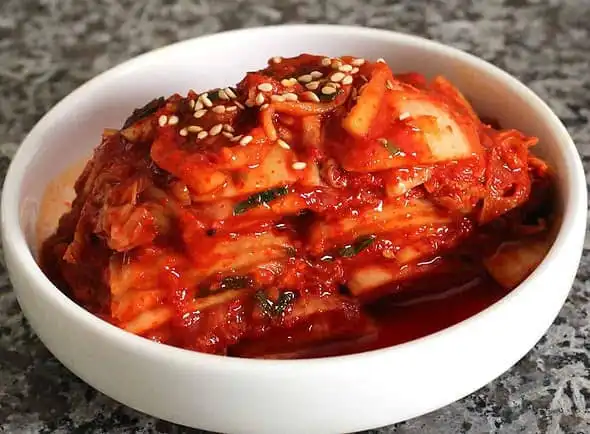Is Kimchi Halal? A Detailed Guide

Kimchi, a beloved dish from Korean cuisine, often raises questions about its halal status due to the fermentation process. As Islam strictly prohibits the consumption of alcohol, many Muslims wonder if the alcohol produced during the fermentation of kimchi makes it haram.
In this article, we will explore whether kimchi is halal, why it is considered permissible for Muslims to consume, and what Islamic scholars have to say about the small amount of alcohol released during fermentation.
By the end, you’ll have a clearer understanding of the Islamic perspective on fermented foods and how to ensure the kimchi you eat is halal.
What is Kimchi?
Kimchi is a staple in Korean cuisine and is widely enjoyed across various Asian cultures. It’s a traditional side dish made primarily from fermented cabbage, radishes, and a variety of spices, including garlic, ginger, and red pepper.
Kimchi is known for its tangy, spicy, and sour taste, resulting from the fermentation process that can take days or even weeks.
While kimchi is typically vegetarian, some variations may include non-halal ingredients like fish sauce or shrimp paste.
As a result, Muslims should always verify the ingredients before consumption to ensure the dish is halal. Many store-bought versions are labeled halal or contain a clear list of ingredients, making it easier for Muslim consumers to make informed choices.
Is Kimchi Halal?
Yes, kimchi is widely considered halal due to the minimal amount of alcohol produced during fermentation, which is not enough to intoxicate. Islamic scholars have provided clear guidance that naturally occurring alcohol in small, non-intoxicating amounts does not render food haram.
To ensure you’re consuming halal kimchi, pay attention to the ingredients, especially in store-bought varieties, and consider making your own at home.
Kimchi not only aligns with Islamic dietary laws but also offers numerous health benefits, making it a great addition to your diet.
READ ALSO: Is Monster Energy Drink Halal or Not?
Why Is Kimchi Halal?
Kimchi is considered halal primarily because it contains no forbidden ingredients, and the tiny amount of alcohol produced during the fermentation process is negligible.
In Islam, the general rule is that all food is halal (permissible) unless there is clear evidence from the Quran or Hadith declaring it haram (forbidden).
Since neither the Quran nor the Hadith explicitly mentions kimchi or fermented vegetables as haram, it remains permissible.
The small traces of alcohol in kimchi are a byproduct of natural fermentation. Islamic scholars, including Shaykh Ibn ‘Uthaymeen, have stated that if alcohol is present in minute amounts that cannot intoxicate a person, it is not considered haram.
A fatwa from IslamWeb confirms that when alcohol is produced in such low quantities that it cannot cause intoxication, it does not make the food haram.
Therefore, fermented foods like kimchi, where alcohol levels are minimal and non-intoxicating, are considered permissible in Islam.
Understanding Alcohol in Fermentation
Fermentation is a natural process in which bacteria convert sugars into acids or alcohol. In the case of kimchi, the fermentation process releases a tiny amount of alcohol as the sugars in the cabbage and radish break down.
However, the amount of alcohol is so small that it does not have the intoxicating effects of conventional alcoholic beverages.
In Islam, foods containing such small amounts of alcohol are still considered halal as long as they do not intoxicate, even if consumed in large quantities.
This principle applies to many fermented foods, such as yogurt, vinegar, and sauerkraut, all of which produce trace amounts of alcohol but remain permissible for consumption.
Fatwas on Fermented Foods
Islamic scholars have extensively discussed the halal status of fermented foods, and the consensus is that they are permissible if the alcohol content is insignificant.
Shaykh Ibn ‘Uthaymeen, a well-known Islamic scholar, has issued fatwas clarifying that small amounts of alcohol naturally occurring in food during fermentation do not render it haram. He explained that as long as the alcohol level does not lead to intoxication, the food remains halal.
Furthermore, IslamWeb, a reliable source for Islamic jurisprudence, has issued a fatwa stating that if alcohol is produced in food during fermentation but does not reach a level where it intoxicates, the food is halal.
This ruling is based on the principle that it is not the mere presence of alcohol that makes something haram but rather its potential to cause intoxication. Since kimchi’s alcohol content is too low to have any such effect, it is permissible to eat.
Does Alcohol in Kimchi Make It Haram?
There are hundreds of kimchi recipes, and none of them include alcohol as a deliberate ingredient. However, the fermentation process can release small amounts of alcohol naturally.
Despite this, the alcohol content in kimchi is far too low to be intoxicating, even if consumed in large quantities. Therefore, it is not considered haram.
The general rule in Islam regarding alcohol in food is that if consuming large amounts of the food does not lead to intoxication, it is permissible to eat.
For example, kombucha tea also contains trace amounts of alcohol due to fermentation, but this amount is so small that drinking kombucha will not intoxicate you, even in significant quantities. The same principle applies to kimchi.
How to Identify Halal Kimchi
While the fermentation process itself is halal, Muslims should be cautious about the ingredients used in certain kimchi recipes.
Some varieties may include non-halal components, such as fish sauce or shrimp paste, which may not be permissible unless derived from a halal source.
To ensure your kimchi is halal, check the ingredient list or look for halal certification on store-bought products. Alternatively, making kimchi at home allows you to control the ingredients and ensure they are all halal.
Health Benefits of Kimchi
Kimchi is not only a permissible food for Muslims, but it also offers several health benefits. As a fermented food, it is rich in probiotics, which promote gut health and improve digestion.
Kimchi is also packed with essential vitamins, including vitamins A, B, and C, and is a great source of fiber. The fermentation process increases the bioavailability of nutrients, making kimchi a nutritious addition to any diet.
Additionally, kimchi has antioxidant properties and may help boost the immune system. Its blend of vegetables, spices, and beneficial bacteria contributes to overall well-being.
As with other fermented foods, the fermentation process in kimchi enhances its flavor while offering numerous health benefits.

How to Make Halal Kimchi at Home
If you want to ensure your kimchi is completely halal, making it at home is a great option. Here’s a basic recipe for halal kimchi:
Ingredients:
- Cabbage (Napa or regular)
- Radish (optional)
- Garlic
- Ginger
- Red pepper powder (adjust to taste)
- Onions
- Salt
- Sugar
- Vinegar
- Spices (such as pepper, mustard seeds, or cumin)
- Fruits (like apples or pears for added sweetness)
Method:
- Prepare the Cabbage: Cut the cabbage into quarters and soak it in salted water for a few hours until it softens.
- Make the Spice Paste: Blend garlic, ginger, onions, red pepper powder, and your chosen spices with a little vinegar and sugar until you have a thick paste.
- Mix the Ingredients: Rinse the cabbage, then coat each leaf with the spice paste. Add thin slices of radish, if desired, for extra crunch.
- Fermentation: Place the cabbage mixture in an airtight container and leave it to ferment at room temperature for 1-3 days. Taste periodically to achieve your desired level of tanginess, then refrigerate.
This recipe ensures you’re using halal ingredients, and you can adjust the spices and fermentation time to suit your taste preferences.






